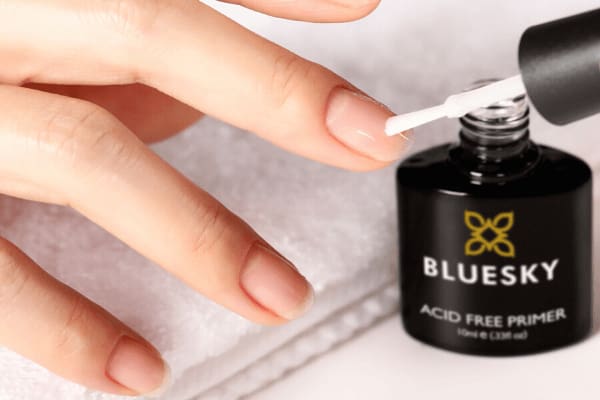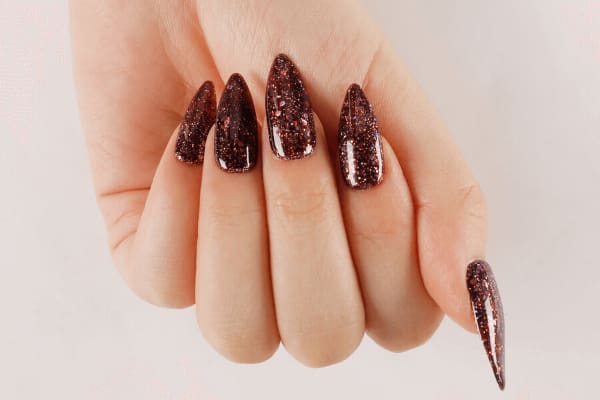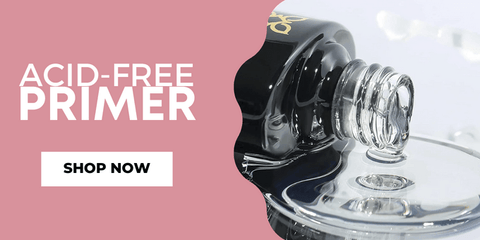Proper preparation is key to your gel manicure success. Without it, your nails can end up chipping after a few days or even peeling, meaning all that time spent creating your new nails could end in disaster!
We’ve already gone through plenty of tips for preparing your nails properly for gel application, but one product that is becoming increasingly popular is primer. When used properly, it can be the key to longer-lasting gel manicures for plenty of people.
What is a primer?
A primer can be used at the very start of your gel nail manicure to prime the nail. Primers will remove any remaining oils and grease on the nail plate, which can otherwise lead to your base coat not adhering to the nail. It also prevents the creation of any air bubbles for better adherence.
What types of primer are there?
There are two types of primer: acid-free and acid primer. Acid-free primer is the most commonly used primer, with a gentle formula that helps greatly with adhesion. Acid primer works best for more problematic nail plates and those with hormonal problems. It’s a stronger substance that etches the nail plate to help the gel polish stick to the nail.

Who needs to use a primer?
A primer is perfect for people who struggle with chips or lifting with their gel manicures. It provides flawless adherence of the product to the natural nail plate, acting as a bonding element for the base coat which is then applied on top of it.
How do you apply primer?
Your primer is always applied first. Apply acid-free primer with an almost dry brush to each nail and let it dry for around 40-60 seconds. Acid-free primer won’t fully evaporate, and it’s okay to work on it if it’s still slightly wet. If you’re infilling, make sure you only apply a primer to the natural nail plate.
When applying an acid primer, put 1-2 small dots on the nail. It will then spread by its own across the nail plate. With acid primer, make sure it has fully evaporated before continuing with your gel manicure.
What are the main benefits of using a primer?
Acid-free primer is great for those of you who struggle with any lifting, chipping or peeling with gel manicures. Sometimes, nails hold onto oils and even wiping with a cleanser wipe doesn’t remove all excess grease from the nail plate. By using an acid-free primer, the oils are then fully removed which means long-lasting, chip-free manicures!
Acid primer is best used for anyone who has very problematic nail plates or anyone who may suffer from any hormone problems or is on specific medication, which can affect the nails. It’s a stronger substance that can greatly help in situations such as this.

Do I need to use a primer?
If you find that your gel manicure already lasts 2+ weeks with no chips or lifting, then adding in an extra step isn’t always necessary! Make sure you take a look at our guide on how to apply gel polish to pick up some handy tips for avoiding lifting before adding a primer into your routine, too.
Mix & Match Gels:
Buy 6-11 and SAVE 15% / Buy 12+ and SAVE 20%



Jashan athwal
Nic
Trang Huynh
Can I use primer acid free for Dip nails?
Dolores M Troup
I love gel polish and SNS, but I found out that I am allergic to primer. What can I do?
Bluesky
Hi Dani, yes you can use under builder gel :)
Bluesky
Hi Sophie, our primer is a dehydrator so you wouldn’t need to use both. This works alongside the acid free primer as an extra step for keeping gel nails lasting longer. Ph bond balances the ph of your natural nails which ensures optimal polish adherence! You don’t have to use both but some do find that this helps as an extra step especially clients with oilier nails! Base Coat would then follow after Bond/Primer :)